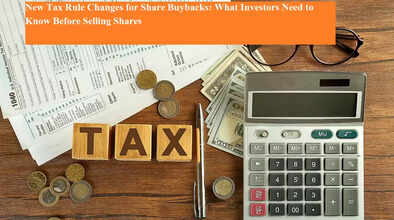New Tax Rule Changes for Share Buybacks: What Investors Need to Know Before Selling Shares

The Indian government has introduced a major change in the taxation of share buybacks, altering how investors are taxed when companies repurchase their own shares. As per Budget 2024, the responsibility of paying tax on buyback gains has now shifted from the company to the shareholder. This amendment, effective from October 1, 2024, has significant implications for retail and institutional investors alike.
What Is a Share Buyback?
A share buyback (also known as a share repurchase) occurs when a company buys back its own shares from existing shareholders. By doing so, the total number of outstanding shares in the market decreases, which can boost the earnings per share (EPS) and often lead to an increase in the share price.
Companies typically conduct buybacks for several reasons:
-
To return surplus cash to shareholders.
-
To improve key financial ratios like EPS.
-
To increase promoters’ or management’s shareholding.
-
To stabilize the market price of shares when they are undervalued.
In essence, a buyback is a way for companies to reward shareholders while maintaining control and reducing equity dilution.
What Has Changed Under the New Tax Rule?
Before the Budget 2024 announcement, companies were required to pay 20% buyback tax on the difference between the issue price and the buyback price. This system kept the shareholders exempt from direct taxation on the amount received.
However, under the new rule applicable from October 1, 2024, the tax burden has shifted to the investors. The entire buyback amount received by shareholders will now be treated as dividend income under Section 2(22)(f) of the Income Tax Act, and taxed accordingly based on the investor’s individual income tax slab.
This means:
-
Companies no longer pay buyback tax.
-
Investors are taxed as per their applicable income tax rate, which may go as high as 35% for individuals in the highest bracket.
-
The amount received from buyback will be considered “deemed dividend” income.
No Cost Deduction Allowed
Another crucial aspect of the rule is that investors cannot deduct the cost of acquisition (the price paid to buy the shares) from the buyback amount. In other words, even if you bought the shares at a higher price earlier, the entire buyback receipt will still be taxed as dividend income.
However, the loss arising from the difference between the acquisition cost and the buyback amount can be treated as a capital loss, which can later be set off against future capital gains under the Income Tax Act.
Example to Understand the Impact
Let’s consider an example for better clarity:
Suppose an investor bought 500 shares of a company at ₹650 per share, while the original issue price was ₹50 per share. Earlier, the company would have paid 20% buyback tax on the difference (₹600 per share).
Now, under the new rule, the company is exempt from this tax. Instead, the investor will have to pay tax on the entire ₹650 per share as “dividend income.” The exact tax liability will depend on the investor’s individual tax slab rate.
Thus, for those in higher income brackets, the effective tax outgo can be significantly more than what the company would have paid earlier, reducing the overall profitability of participating in buyback offers.
What Does This Mean for Investors?
The new rule makes share buybacks less attractive for investors, particularly high-income individuals. Since the proceeds are now taxed as dividend income, the post-tax return from a buyback offer will likely be lower than before.
This change could also impact companies’ decisions to announce buybacks, as reduced investor participation might make the process less effective as a capital distribution strategy.
Financial experts advise investors to reassess their tax strategy and consult professionals before accepting future buyback offers. In many cases, it may be more tax-efficient to sell shares directly in the open market, depending on the holding period and applicable capital gains tax rate.
Key Takeaway
With the Budget 2024 changes, the taxation dynamics of share buybacks have undergone a complete shift. What once served as a tax-efficient reward mechanism for investors has now become a potential tax burden. Investors should carefully evaluate buyback offers, calculate after-tax returns, and plan their investment exits accordingly.
In summary, while share buybacks remain a strategic financial tool for companies, for investors, they’re no longer the effortless profit opportunity they once were.

